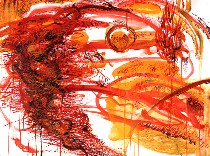 1. Doing the things that we want to
1. Doing the things that we want to
For progressive, Jewishly-educated twenty- and thirty-somethings, it’s very fashionable to struggle. We encounter problematic texts, we wrestle with their meanings in the beit midrash, and we have live in a state of tension with them. We interpret them freely, albeit bound to the traditions of our ancestors. We dynamically balance the call of our heritage on the one hand, and the moral imperatives of our day on the other. And to be Jewish, we know, is to be yisrael, a godwrestler, not content with fideism or despair, because the wrestling with meaning, the search, the uncertainty – that is the religious life.
Yawn.
I’ve heard that speech so many times, and with so many synonyms, that I can recite it in my sleep – I’ve heard it at Pardes, the liberal independent yeshiva in Jerusalem, at Hadar, the liberal independent minyan in New York, at Hebrew College, the liberal independent rabbinical school in Boston, and from lots of liberal independent Jews. And I don’t buy it anymore. Not that I doubt the sincerity of the conviction – the emotional sincerity is exactly the point. What I don’t buy is the intellectualizing, the theologizing, and the amateur philosophizing that disguises the more naked stirrings of the heart. Why can’t we just admit that we’re Jewish because we want to be? If we could do that, and if we could recognize that wanting – and not theology – is the essence of religious life, we might find our religion a lot easier to embrace.
But that’s not good enough. We can’t just admit that we want a mother- or father- figure to hear our cry; we have to invent stories to justify what we want. That God created the universe; that there’s this thing called sin, but that God forgives it; that there’s life after death – all of these doctrines and ideas to answer emotional needs. And then, since of course the doctrines really don’t make any sense, a few sophisticated theologians try to explain how they do make sense if you understand them correctly. So we can have our cake and eat it too: the emotional comfort and the supposed intellectual coherence.
Last month, in my essay Stop Seeking, I talked about how the spiritual search, which ostensibly is about learning to stop endlessly seeking pleasure from outside sources, can sometimes become its own kind of search for the right technique, or rationale, or the new intellectual or spiritual fix. The same is true for theology, and for the endless “wrestling” with texts that supposedly defines mature Jewish engagement. Why not admit that these texts reflect ancient, human concepts, as the academics tell us they do, and be informed but not beholden to them? Well… insert rationale here.
When what it really is about is what we want. Motive is always present, especially among the Orthodox who say “Motive? I have no motive! God commanded me!” That motive is the most present of all: the motivation to obey God’s command; to feel alright; to feel like I’m doing the right thing, or that there is a right thing to do in the first place. Consider any sentence beginning: “I keep kosher because…” Or more generally: “I am Jewish because…” I’d be willing to wager that, unless the completion of the sentence has something to do with desire, that is, with the heart, almost any words will be deceiving. I am Jewish because it is my heritage? Not really – it’s because I want to connect somehow with my heritage. I keep kosher because it is part of a halachic, precedential system that I subscribe to as part of the Jewish national experiment? Come on – you do it because you want to.
2. Stop Making Sense
Faith, in its purest form, is inchoate. Unlike faith-in-something, which has a cognitive object, it is a disposition of trust toward the universe. It’s an attitude, a way of being, that has no particular object and no theory to which it is beholden. (“Trusting your own deepest experience,” Sharon Salzberg calls it in her book Faith; not letting it be undermined by a corrosive doubt). It’s only when faith is combined with ideas, particularly about how the world should be, or about how it came to be the way it is now, that faith translates into self-deception, or distraction, or even dangerousness.
Sam Harris, in his recent books and articles, has recently and powerfully attacked almost all religious beliefs as being unjustified, incoherent, and harmful. Recently, on jewcy.com, Harris debated Jewish right-wing radio talkshow host Dennis Prager, and they talked theology. Harris argued that any belief in God must be justified – otherwise, you might as well believe in the Flying Spaghetti Monster – and that it was impossible to justify or prove the existence of an incorporeal, omnipresent deity. Prager countered with some of the classic arguments for the existence of God (design, cosmology), but really seemed to focus on the necessity of belief in God, without which, he said, we’d all be rudderless hedonists, adrift in an immoral world of corruption and sin.
 Each side was arguing a different theological theory, talking past the other. (I wrote a response to the debate in Jewcy; you can read it here). But the larger question is: why were they talking theology at all? Do people really believe or not believe in God because of the merits of theological arguments? Come on. The argument was like one of those medieval disputations which carry on ad nauseam even though everyone’s mind is already made up – indeed, because everyone’s mind is made up, and so each party marshals all the arguments available to defend the position he (it was almost always ‘he’) wants to defend. If we choose to believe – that is, if it is not simply a matter of replicating the ideologies of our childhoods – we do so for emotional, not intellectual, reasons. The intellectual part is just window-dressing.
Each side was arguing a different theological theory, talking past the other. (I wrote a response to the debate in Jewcy; you can read it here). But the larger question is: why were they talking theology at all? Do people really believe or not believe in God because of the merits of theological arguments? Come on. The argument was like one of those medieval disputations which carry on ad nauseam even though everyone’s mind is already made up – indeed, because everyone’s mind is made up, and so each party marshals all the arguments available to defend the position he (it was almost always ‘he’) wants to defend. If we choose to believe – that is, if it is not simply a matter of replicating the ideologies of our childhoods – we do so for emotional, not intellectual, reasons. The intellectual part is just window-dressing.
In fairness to Prager (with whom I almost always disagree), the theological tone of the conversation was Harris’s fault. Harris is right that you shouldn’t believe something just because you want to – but he doesn’t do much with that wanting. What is the meaning of the yearning of the heart? Is it really as ridiculous as the intellectual “answers” provided for that yearning? Is not the question, perhaps unlike the answer, as beautiful as the appreciation of painting, dance, or music? Harris treats religion the way a bad junior high school teacher treats a poem: as really about its meaning, which is to say, the information it seeks to impart. “Ohhhh, Leda and the Swan is about bestiality! Now I get it!” Whereas, a connoisseur of art or of religion knows that the informational content of the myth is far less important than the way the myth functions in a self-examined life. I don’t care about whether Abraham left Ur and came to Canaan; I care what his journey means to me, to my family, and to my people. I care about what it must have been like for Isaac to submit to the violence of his father, and about his soul, so strong, so willing, so bound. I care about these sacred texts not as pseudo-science or pseudo-history, but as myth.
Of course, I’m not naive enough to suppose most religionists are “connoisseurs” of religion. No – they eat the dog food and drink the kool-aid. Bible says six days, it must be six days. And it must, somehow, matter that it’s six days, because if you don’t think it is six days, you haven’t submitted yourself to the will of God, which means you’re still deluded and damned. I also understand Harris’s argument that moderate religionists are part of the problem, because they allow the dangerous barbarians to persist in their absurd and dangerous beliefs. But what do we do with the yearning, the love, the connection, the stories, the traditions – is all of it really to be cast aside because some people take them to literally?
To be clear, I’m not advocating a Maimonidean solution either. Well aware of the fact that thoughtful religious people and thoughtless religious people believe completely different things, Maimonides set about creating a system whereby intelligent “philosophers” could reconcile their faith-tradition with what they knew to be true about the universe. He did this for a number of reasons: so they could remain in their faith-community, so that they could live with their families, so that they could be part of the historical continuum of the great Jewish experiment.
Maimonides’ answers, some of which Prager marshaled, do allow religionists to escape Harris’s theological objections. But Harris would be right to accuse them of false consciousness. Personally, I’m no longer interested in writing my own Guide for The Perplexed, in somehow making the Bible fit quantum mechanics or relativity. As if I’d stop being Jewish if I couldn’t make it all fit. It’s obvious that these weird books on the Bible and science are written because the writers really like their Judeo-Christian folkways, and want to somehow explain it. Yet isn’t it equally obvious that whoever wrote the Bible really did think the Earth was flat, that the two lights God made revolve around it, and that the Creator of the world chose the Israelites to be the bearer of His message? And why the hell does it matter?
If I had no felt sense of God, nothing anyone says about quantum mechanics would convince me. So, if I do have a felt sense of God, why do I care about physics?
I used to care, because I, like most intellectuals, don’t like cognitive dissonance. I prefer it when all the answers fit, when it makes sense to the mind. But lately I’ve come to accept that God is not going to fit. Sure, the idea is internally consistent, but as Harris points out, it’s not quite necessary. It’s what my heart feels, not my head. On meditation retreat, for example, I don’t quite get God automatically, but I do get the sense of God – the sense of holiness, sacredness, beauty, sufficiency, peace – all these purely from a mind that is quiet, relaxed, and concentrated.
Now, is it wrong to move from the sense of God to “God”? Yes if it includes dogma, or attributes imported from somewhere else, or intolerance. Yes if it means saying something about how the world is, or how it ought to be, even if the “sense” is quite certain – since you can be certain and wrong. But surely it’s not wrong to speak the language of the heart, and give that mode of speech its due. Must we understand the sense of sacredness merely as a neuro-physiological event? And if so, then why not similarly reduce love to gametes? I’ve seen, in the quiet of the retreat, that my heart speaks the language of God, and of Judaism, and that my brain trying to make sense out of it is really secondary. Reciting the Ashrei is my way of buying a bouquet of roses for the universe. After all the tragedies of the world, I can’t say what God hears and doesn’t. I just know I want to express love.
And I want, more than before, to be free of justifying what I want, as long as I don’t force anyone else to speak my heart’s language. I don’t want to construct a system that makes it okay to be religious in the way that I am, or wrestle with problem texts. I want to admit that I love and that’s all. Sure, one might create a non-theistic devotional practice, through art or yoga or meditation that conveys the love without the worryingly ambiguous trimmings. But for me, saying “God is What Is” just feels different, and juicier, than saying “This is What Is.” Call me a failed Buddhist, but I’ll take the path of love.
I’ll even go further than that. I’m not interested in translating the text of Hebrew prayers to make them somehow less ethnocentric, or in some way more theologically acceptable. I accept that the people who wrote those prayers were sexist, homophobic, anthropocentric – and possessed of enormous religio-poetic sensitivity. Not to mention an inner stillness that it takes me days of silence to cultivate.
Of course, I recognize that the sexist (and otherwise problematic) language of prayer can be painful for people – and so changing the language is better for that reason. But auditing prayer to make it theologically kosher? Who the hell are we kidding? We’re praying – what in God’s name is philosophically defensible about that? I also understand that repeating all this dualistic language – God, please help me; I need you; I want to be close to you – is philosophically problematic, and reinforcing the wrong ideas about God. (More on that later.) When I read the old texts, it’s obvious that God is a guy, who may or may not have a body but who definitely does have personhood and separateness from us. He tells us to follow his commandments in exchange for his making the rain fall, and He tells us to follow the rules. (And when I’m honest with myself, I admit that sometimes I still believe these ideas – my mind going to things like the survival of the Jews, and the impending destruction of Western Civilization… little “proofs” that the Good Book may be right after all.) No, it does not make sense.
But would we demand that someone praying for her sick child “make sense”? And if we wouldn’t, why demand it of ourselves? Auditing our religious beliefs, but not similarly restraining our impulses to love, play, laugh, and cry, is inconsistent. Hey, you’re either right on the facts or you’re not. Conversely, is it really more honest to shoehorn those old texts into my theology, my ethics, and my understanding of how the world works? Or should I just accept that that’s there world, this is mine – and we are united by love, not theory.
So, thanks, but keep the godwrestling. It’s not that the consummately Jewish practice of textual reasoning isn’t important and beautiful; it’s that, for me, it’s often an exercise in false consciousness. On the one side, crafting elegant theological nonsense to justify exactly which preference about the universe we seek to ensconce in religion. On the other, denigrating the heart by insisting that its stirrings conform to the precepts of reason.
Love what you want – just don’t think you’re right. I’d rather accept that this is what my heart wants than pretend it’s what my mind agrees with.
====
 3. ….and then there are the things we don’t know that we don’t know
3. ….and then there are the things we don’t know that we don’t know
The good news is that once the wrestling stops, you can let God win. If there’s one thing theology is useful for, it’s negative theology: telling us that we don’t know what we think we know. Think you know the purpose of life? You don’t know. Think you know what God wants from you? You don’t know. Think you know what God is, or that God is, or that what the word “God” even means? You don’t know. And as soon as I don’t have to know anything, the world opens up.
Let’s try it.
That wonderful sense that you get when you make the world a little less painful for someone who is suffering – no, that’s not God.
That sense of victory that you get when your team/nation/army/tribe wins its battle – nope, not God either.
The promise-keeper of Israel, the smiter of enemies, or, on the other side, that powerful moral imperative, that causes you to know, deep in your guts, what the right ethical choice is at any given moment – sorry.
All of these are myths, projections, hopes, and yearnings. Beautiful, but not “it” – at least, you can’t prove it. Indeed, many theologians would say they can’t be it, for various philosophical reasons. But leave that aside – let’s just ask what you can know is true about God. Of course, the answer is nothing.
Here’s a simple way to remember it: As long as God is everything and/or nothing, we’re doing fine. It’s when we think God is something that we’ve gotten into trouble.
 Good? Powerful? Male? Ineffable? All concepts, all projections. In a future essay, I’ll talk about this in more detail – how Kabbalah, beginning from a place of nonduality, ends up in a place of polytheism, and brings all these concepts back into the religious worldview. For now, it’s just useful to remember that, if we just ask carefully what it is we actually know, we instantly disabuse ourselves of all the lousy ideas we project up into the heavens. How do you know that God wants a gentler world, but doesn’t want child sacrifice? You don’t – you just want it one way and not the other. How do you know that God loves Israel, and not the Palestinians? Same reason. How do you know God loves all people equally, regardless of nationality? Again, you don’t. How do you know that God did or didn’t write the Torah? You get the point.
Good? Powerful? Male? Ineffable? All concepts, all projections. In a future essay, I’ll talk about this in more detail – how Kabbalah, beginning from a place of nonduality, ends up in a place of polytheism, and brings all these concepts back into the religious worldview. For now, it’s just useful to remember that, if we just ask carefully what it is we actually know, we instantly disabuse ourselves of all the lousy ideas we project up into the heavens. How do you know that God wants a gentler world, but doesn’t want child sacrifice? You don’t – you just want it one way and not the other. How do you know that God loves Israel, and not the Palestinians? Same reason. How do you know God loves all people equally, regardless of nationality? Again, you don’t. How do you know that God did or didn’t write the Torah? You get the point.
We all have preferences about how the world should be, and some of those preferences definitely seem better to me than others. Some of them, after all, are tested by reason, and by moral conscience, and by a thousand other ways to sift mere preference from authentic moral sentiment. But all of that takes place prior to the projection of moral sentiment upon this or that sacred text. What does “Judaism” say about social justice, anyway? That you should feed the naked – or slaughter all the non-Israelite tribes? That everyone is responsible for everyone else – or that the wicked must be judged for their bad deeds, regardless of what “made them do it”?
Even Kant couldn’t quite get the categorical imperative to hang on anything but skyhooks. (For Kant, it just seems so right, rationally speaking of course, that it has to be right; certainly more reflective than the Molech-worshipper, but different in kind, or degree?) So let’s stop kidding ourselves. We should all do our best, developing the moral sentiments, nurturing compassion, cultivating critical thinking – all the things that help us make kind and wise decisions (and not coincidentally are in short supply in a political class beholden to dogma, faith, and authority). But let’s leave God out of it. We don’t know anything about the purposefulness, purposelessness, godlessness, or godfulness of the cosmos. We can’t even figure out how to manage our own little corner of that cosmos without burning it up in carbon dioxide, for crying out loud – do we really think that we’re capable of deducing, somehow, the point of it all? Please, negative theology, come and save us. Remind us that we have no idea. We have beautiful minds, hearts, and bodies – but they all have their limits.
The non-knowledge of negative theology is really something. Really something. Suppose you went through the day doubting every non-perceptual idea that you have. Not just the God stuff – but everything: politics, fashion preferences, how people are supposed to behave. It’s not that you don’t have these ideas, and act on them sometimes – it’s just that you’re not so sure. Would that lead to more conflict, or less? Would you be more open to the impressions of the world, to the daily music of humanity, to the power of Nature, or less? Would you be more detached, or more engaged?
Sometimes, the myths of Judaism help me to feel wonder. Other times, it’s sometimes easier to say “I am grateful to the earth, air, fire, and water that created this food” than it is to bench birkat hamazon. Both feel ok, since I really have no idea. I don’t even know what I don’t know.
I’m not proposing anything radical – just letting the heart have its place and the mind its. Let’s not have the mind pretend to have anything to say, really, about the essence of religion; let’s let the heart soar. And, conversely, let’s not pretend that the heart’s yearnings about God have anything to say about how the world should be – let’s leave that to calm and rational reflection, coupled with human moral sentiment. Wouldn’t we all get along better, and be more honest with ourselves, to boot?
Or would it be just too terribly embarrassing, to admit that we choose God out of love and not reason?








Attractive part of content. I just stumbled upon your site and in accession capital to claim that I acquire in fact enjoyed account your blog posts. Any way I’ll be subscribing to your feeds and even I achievement you get entry to constantly quickly.
wireless headphones are the best because they do not have those bulky wires`
well, monetizing websites and stuffs should be great. making money on the internet is a great way to earn money“
Sweet internet site , super pattern , real clean and employ genial .